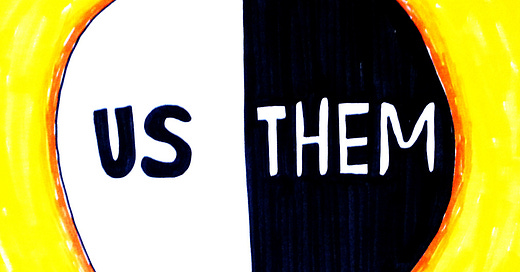Whether we’re trying to sort out what’s happening in Ukraine and Putin’s claims to an imperial Mother Russia, or trying to understand Pro-Palestinian TikTok and whether or not Israel has a right to exist, or diving into the coups and genocides in Sub-Saharan Africa, we’re all trying to sort through a basic question of
“how did things get so horribly, tragically sideways of late?”
If we take a long arc historical look at it, there’s three main drivers to all of this conflict and suffering: tribalism, colonialism and capitalism.
Often they get lumped together. Sometimes, they’re implicated but not named at all. Other times, we hear slogans and labels like “decolonialize Gaza, or Africa, or the Global South” as if that’s Job One and everything will be fixed if we could pull that off.
But we don’t necessarily know what that would look like, or mean in real life.
Without getting into hottakes on specific global events, here’s three ways of looking at those drivers that can hopefully offer us insight and healthier interventions.
Each one of these cultural forces favors one group at the expense of another group. But in real life, they don’t arise neatly or in sequence.
In our post-modern age, we’re dealing with a mixed bag of tribalism, reckoning with the legacy of colonialism, and neck deep in the consequences of capitalism, all at the same time!
But teasing them apart is helpful because it lets us understand their function, their disfunction and ways to fix them.
It’s only by clocking these “externalities” that we have the chance to rejigger a more inclusive and equitable calculus that works for everyone, and everywhen.
Let’s take them one at a time and in order of historical emergence.
Tribalism is the most ancient of the three–it creates psychosocial externalities. We sort for who’s in and who’s out along the “race, caste, creed, blood, soil” dividing lines. We do it by denying humanity to the Other. With the spread of religions and nationalism, this impulse got rolled into larger and larger group identities, but it’s all fundamentally the Us vs. Them game.
Despite all of our fairly recent lip service to a global citizenry, a careful study of biology highlights how strong our tribal wiring still turns out to be.
“There are really two ways in which cooperation evolves,” evolutionary biologist Bret Weinstein notes. “The first one is very ancient and is based on genetic relatedness. . . . The other kind of cooperation is based on various kinds of reciprocity and it is much newer and much more fragile [starting 10,000 years ago].
When reciprocity-based cooperation breaks down we default to gene-based cooperation. . . . Backing people against the wall who have a genetic basis for cooperation is very dangerous because history tells us . . . they may turn into a genocidal menace.”
As often as not, biology beats psychology. That’s what puts the power in White Power. So when we advocate for more inclusiveness, or the righting of societal wrongs, we need to pay attention to the tribal foundation our lives are built on.
Changing our pronouns on Zoom or doing Wikipedia land acknowledgments isn’t gonna cut it.
When people undergo sustained chronic stress due to loss of social status, economic hardships, and general dislocation (as is increasingly happening around the world), their serotonin levels get depleted.
They’re more likely to behave vengefully.
When we meet in large crowds like political rallies, protests, or sporting events, something else happens—both serotonin and dopamine surge. We feel better. That’s a huge part of the power of crowds. But that dopamine spike kills our “hyperaltruism”—or kindness to strangers.
Doped up on dopamine, we feel better, but we behave worse. Soccer hooligans know this well!
There’s an even deeper layer of neurochemistry that drives group bonding— oxytocin. While oxytocin has been touted as the “cuddle drug,” the “love hormone,” and even the “moral molecule” because of its ability to prompt generosity and bond mother to child and lover to lover, it, like most explanations of the biology beneath our psychology, isn’t quite that simple.
“Now these studies [showing the positive effects of oxytocin] are scientifically valid, and they’ve been replicated,” Yale’s Molly Crockett explains, “but they’re not the whole story. Other studies have shown that boosting oxytocin increases envy. It increases gloating. Oxytocin can bias people to favor their own group at the expense of other groups. And in some cases, oxytocin can even decrease cooperation. So based on these studies, I could say oxytocin is an immoral molecule.”
Katherine Wu, a Harvard immunologist, takes it a step further. “Oxytocin [also plays] a role in ethnocentrism, increasing our love for people in our already-established cultural groups and making those unlike us seem more foreign. Thus, like dopamine, oxytocin can be a bit of a double-edged sword.”
Tribalism is the last level of social identification and belonging we are hard-coded to support. After genes and oxytocin bond us to the ones we love, and intensify our willingness to “Other” the others, everything else we aspire to is elective and not at all guaranteed.
Left to our own devices, we regress under stress. (and given the atrocities and hardship in the world right now, it’s fair to say there’s a bunch of regressing going on.)
Put simply, tribalism is destiny. Humanism is optional.
***
Next up, let’s consider the phenomenon of Colonialism.
While trade has been an integral part of all societies and an essential engine of intermarrigage, cultural exchange, and technological advancement, it was most often conducted between two approximately equal partners.
Colonialism isn’t equitable. You can think of it as “asymmetrical trade, at the point of a sword.” Taking valuable raw materials, labor and natural resources from one place and concentrating/consuming/imnproving it someplace else.
Where tribalism enforces psychosocial externalities (Us vs. Them) Colonialism–enforces geographic externalities.
“Robbing Pedro and Patel to pay Paul”
This has obvious implications, especially when we pay lip service to a global citizenry and a “commonwealth” of nations.
When Queen Elizabeth finally snuffed it a few years ago, former colonies demanded a whopping $45 trillion in reparations from Britain to make up for centuries of exploitative colonialism.
From Vice:
"Indian economist Utsa Patnaik’s calculations show the massive amount of loot taken from the Indian subcontinent over a course of 200 years. “Indians were never credited with their own gold and [foreign exchange] earnings,” Patnaik told local media about her findings. “Instead, the local producers here were ‘paid’ the rupee equivalent out of the budget – something you’d never find in any independent country.””
Translation: We'll take the profit in pounds sterling, we'll pay you minimum wage in rupees for your troubles administering the fleecing of your own nation. (and we'll upcharge you over $120 million in taxes for your troubles!)
"Had the Indian subcontinent been paid its international earnings, it would have been far more developed, with better health and social welfare indicators," Patnaik added.
A Pakistani historian echoed her point.
"Countries in the Indian subcontinent continue to face the repercussions of these economic extractions. “Because of this history, we have aid dependency, like you see in Pakistan and Bangladesh, and even India to some extent. We have a historical, structural disadvantage vis-a-vis Europe,” he said. “We’re still caught in a historical cycle of 250 years of plunder and structural poverty.”
Former Prime Minister David Cameron, when asked about returning some of the marquee loot (like the Queen's famous diamonds) replied that if they were to say yes to demands, “then you would suddenly find the British Museum empty.”
So, um, no, awfully sorry, we're not giving you your shit back.
Which echos the epigraph to The Godfather, "behind every great fortune lies a great crime!" (Puzo was inspired by Balzac on that one)
The British Crown (and the German, French, Dutch, Spanish, Japanese, Chinese and U.S governments) are all on the hook for variants of this global shell game. Huge slugs of nationalized wealth came from the raw materials and cheap labor of colonies (historic or economic).
The Middle East is a jigsaw puzzle left over from oil wars and political gerrymandering. As is the former Soviet Union, much of Africa and Asia.
Robbing Pedro (or Patel) to pay Paul works, until Pedro gets radicalized by a Marxist pope. Or Russel Brand.
Then there's some decidedly awkward conversations in the offing.
***
Now let’s hit the third mark, the market. It’s such a potent force, inextricably bound up with the colonial era that birthed it.
But while colonialism leverages geographic externalities (in what Marx called the Metabolic Rift–breaking ecosystems to concentrate their fruits far away from where they originated), capitalism does something similar, but with Time instead.
Capitalism–incentivizes temporal externalities. Extract profit now (fossil fuels, aquifer water, topsoil depletion, overfishing, clearcut logging) vs. save some for later/regeneration.
We’re forever “eating our seed corn” which leaves less and less of our natural resources to invest in the next generation.
We're all familiar with behavioral economics––and how we would rather have a bird (or a marshmallow) in the hand, rather than two in the bush.
But when our markets can only see at three month to annual intervals, anything longer time framed than that, vanishes into the heavily discounted mists of the Not Yet. And irrelevant.
So when an indigenous elder says something like "we want to protect our territory for our children's children, we are the stewards of this land forever," that simply doesn't compute in the Moloch Math of the Market.
Even though it rings true as gospel for any people rooted to any place, in any time.
It can't just be a good idea for this quarter, or this earnings report, or this CEO's exit package.
It has to be a good idea for our children's great, great, grandchildren.
Because it's not just the privatizing of profits and the socializing of losses that we're up against. It's the presenting of profits and the amortizing of losses to future folks that don't yet have a voice.
In a truly free market, where price is allocated accurately to goods and services, and reconciles temporal externalities then we'd maybe have the chance to make wiser decisions, and not be victims of the mindless Moloch we conjured for ourselves.
A patch of old growth rainforest would have incalculable value because each generation's future use and benefits would be baked into its "stock price." No one could afford to build a deck of (7 generationally priced) old growth redwood, so they would find another alternative.
An iPhone, laden with rare earth metals would cost well over $10K, and we'd keep them for over a decade. And you better believe we would have those "right to repair" laws firmly in place so we could upgrade circuits and cameras as we went.
***
Once we tidy those three things up––psychosocial, geographic and temporal externalities, our civilizational math could work again.
It's less that we need to abandon nationalism or capitalism, than we need to actually free the market from corporate cronyism, and extractive, destructive behaviors.
And the Global South could have some kind of reset/rebate program where lost capital (financial, human, and natural) from the age of colonies and global development could be credited against all those looming deficits so ingeniously engineered by the World Bank and IMF.
As for the tribalism, I reckon we’re never gonna escape that one. We are hardwired to care for kith and kin. But we can work on being better neighbors. We can avoid blood and soil, or caste and creed forms of Othering, and instead reorient around a Bioregional Tribalism.
We are connected to those we live among and beside, and we have a vested interest in ensuring clean air, water and soil.
Would it be fun?
Not at first.
Everything would rocket up in price, to better reflect actual cost. We would leave fruit on the trees, and trees in the ground. We would only take a portion of the harvest to ensure seed corn for tomorrow.
We would stop mistaking theft (from neighbors or descendants) for wealth.
Does this solve or fix anything going on in the world today? Not likely.
But it at least lets us spot the leaks in our logic, where we’re not accounting for the externalities that harm ourselves and each other.
If Peter Drucker was right, and “you’ve got to measure it to manage it” then tracking these three externalities gives us a shot at tightening up our game, and making the most of the people, tools and time we have left.










Dear Jamie Wheal,
and for all who are interested in the subject,
If you can, this content will help you understand the Indigenous.
Mircea Eliade, The Sacred and the Profane, The Nature of Religion. The Significance Of Religious Myth, Symbolism, And Ritual Within Life And Culture, copyright 1957, copyright 1959...
The Sacred and the Profane... PDF:
https://monoskop.org/images/b/b1/Eliade_Mircea_The_Sacred_and_The_profane_1963.pdf
The Interview: Four Arrows, Jan 15, 1:26 PM:
https://audioboom.com/posts/8230302-the-interview-four-arrows
See: "Pre-conquest Consciousness" by E. Richard Sorenson
https://static.wixstatic.com/ugd/91e041_5a4f8d2572cf44ddb5c98905dc1f3957.pdf
Greater Good’s editors pick the most thought-provoking, practical, and inspirational science books of the year. DECEMBER 9, 2022
Restoring the Kinship Worldview: Indigenous Voices Introduce 28 Precepts for Rebalancing Life on Planet Earth, by Wahinkpe Topa (Four Arrows) and Darcia Narvaez
https://www.amazon.com/gp/product/1623176425?ie=UTF8&tag=gregooscicen-20&linkCode=as2&camp=1789&creative=9325&creativeASIN=1623176425
And see: Darcia Narvaez, PhD, Abstracts:
https://darcianarvaez.com/abstracts
Dear Jamie Wheal,
I am glad you have defined your terms.
Your definition of “tribalism “is perverse.
The indigenous civilization is matricentric and by extension economically mutualistic. That civilization generated many cultures and tribes, all sharing the same worldview of the Sacredness of Life.
What you are referring to, relevant to “us vs. them,” is among the classic tactics of fascism. Fascism is the privatization of government by private concerns, be those private concerns secular or theocratic, or both. From that condition of impunity, then, fascist, necrophilic tactics are deployed.
Biological determinism transposes and superimposes its facts upon economic social concerns which is erroneous and pernicious. Your deterministic “deductions” are wildly false and pernicious.
Your view on colonialism is elementary and superficial.
You expect your readers to “tease out” your generalized content.
Capitalism is the means to universal and systemic, economic stratification, which psychologically is necrophilia. I am not surprised that you have not indentified patriarchy as the “root” of, economic and social, conquest and domination. At 73, I only recently began entertaining that subject more fully. (1) However, I integrate that knowledge into the subject of the four civilizational levels, each grounded upon an economic premise.
In large, the way “out from under this rock” is to open a new economic social context, the reconstruction of the Indigenous.
You be well and be in Good Spirits!
Note, 1: Women’s Revolution, by Abdullah Ocalan
https://www.freeocalan.org/books/downloads/EN-brochure_liberating-life-womans-revolution_2017.pdf
Note: Ruben Nelson’s presentation:
https://canadiancor.com/ruben-nelson-transcending-our-mti-form-of-civilization-exploring-the-new-core-work-of-the-21st-century-cacor-2022-06-2/